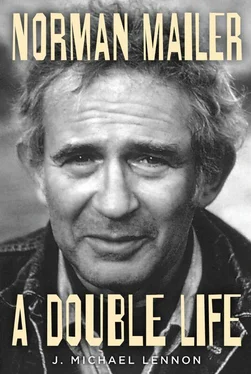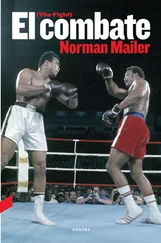Fan, unaccompanied by Barney, came up for a visit in mid-July at about the same time that Mailer quit his job making sandwiches and sundaes. It is likely that it was during this trip that she met Bea, although there is no record of it. He started work as a press agent for the Joy Street Playhouse, a carriage house theater on Beacon Hill. There was no pay, but he got some free meals. He wrote releases, distributed posters, performed short walk-on roles, and schmoozed drama critics. “The work is congenial,” he wrote home at the end of July, “everyone is poor.” In mid-August he went to a reception where he met the cast of Othello —Paul Robeson, Uta Hagen, and José Ferrer — who were trying out the play in Boston before its two-year run on Broadway. This foray into the dramatic world sparked an interest that would last a lifetime. It also gave him a sufficient sense of stagecraft to recast his experience at the state hospital in dramatic form.
To write the play, he decided, quite naturally, to go to the Jersey Shore. The Scarboro was now a vacant lot so he went to Monmouth Beach, where Aunt Beck was that summer. It had been decided that it was time for Bea to meet the clan and she traveled, separately (and thus appropriately), to Monmouth Beach sometime during the last week of August. The round of visits with the aunts and cousins apparently went smoothly because Mailer sent his mother a postcard on the last day of August saying that Beck, the senior sister, liked Bea very much. Bea returned to Chelsea and he got to work on the play, using as the inciting incident the beating of the black inmate. He called the play “The Naked and the Dead.” Mailer scholar Robert F. Lucid, in his commentary on the unpublished play, noted that “Fear, for Norman, had probably always been the most authentic emotion,” and “the administration of fear as a public policy” that he encountered at the hospital “penetrated to the deepest center of his imagination.” He would return again and again to the ways powerful regimes and administrations at all levels of American society created what he called in his first published novel a “fear ladder,” whereby blandishments, threats, favors, and physical harm were increased or decreased as necessary for the maintenance of control, much as the water temperature (euphemized as hydrotherapy) was modulated at the state hospital to pacify unruly mental patients.
It took him fifteen days to complete the three-act, eight-scene play, all of which takes place in a mental institution. In more than one way it seems to anticipate Ken Kesey’s 1962 novel, One Flew Over the Cuckoo’s Nest. The combined and disorienting use of both harsh and sophisticated control methods by a despotic head nurse, the slow corruption of well-meaning staff members in an atmosphere of spying and informing, and the eventual revolt and escape of some of the tyrannized can be found in both works. The play has a number of redundant scenes and the line of action is sometimes difficult to follow, yet it has the force of its “fear ladder” thesis as well as the most believable dialogue he had yet written. After the rebellious black inmate is subdued and sent to hydrotherapy, the two young orderlies in the play realize they cannot change the institution’s deeply embedded methods of control. They quit and go on a fishing trip to regain their equilibrium, much as Nick Adams does in Hemingway’s “Big Two-Hearted River.” But before they go, one has an epiphany, which he blurts out to the other during an argument: “This all happened on a bigger scale in Germany. Germany is like an attendant!” Shortly after finishing the play, Mailer returned to Cambridge, where he submitted the play to the Harvard Dramatic Society and prepared for his senior year.
BY THE FALL of 1942, Harvard had gone to year-round instruction and thousands of army and navy officer candidates were housed on campus. Mailer returned to Dunster, sharing a fourth floor suite with Harold Katz, a mathematics and philosophy major from Indiana. Many of the class of ’43 had gone into an accelerated program and graduated a year early. In late September, he began talking with the Harvard draft advisor about joining the enlisted reserve. He also began checking on graduate school requirements in engineering, but was told that no course could keep him from being drafted.
Harvard had gone to war and Mailer was eager to engage war in his writing, not as background as in several of his previous year’s stories, but head-on. He had been reading Malraux and Hemingway and began planning a new narrative, to be set in the South Pacific, where American soldiers were fighting. Like everyone else, he was getting the dispiriting news from the war front. In April 1942, shortly after General Douglas MacArthur left the Philippines for Australia, the American-Philippine army surrendered to the Japanese on the Bataan Peninsula. The battle for Guadalcanal in the Solomon Islands dragged on through the last half of 1942, causing dismay. The Japanese were on the offensive. This cheerless mood would be reflected in Mailer’s writing. He was not taking a writing course but worked on the novella with his usual focus. His courses that semester were two required engineering courses, a drama survey course, and Henry Murray’s course in abnormal psychology. And, for the length of the fall semester, he awaited word from the Harvard Dramatic Society on the fate of his play. Because of wartime limitations, the society was only mounting plays that could be handled with small stage crews. A note in the Crimson said his play, now retitled “Man Chasm,” was “a dark horse among the plays considered.” Ultimately, the play was turned down and he focused on completing the war novella, which carried a title, “The Foundation,” plucked from a passage in Man’s Fate :
All that men are willing to die for, beyond self-interest, tends more or less obscurely to justify that fate by giving it a foundation in dignity: Christianity for the slave, the nation for the citizen, Communism for the worker.
There was one additional influence: the horrendous fire and pandemonium at the Cocoanut Grove supper club in Boston. On the night of November 28, 492 people, including many servicemen and their companions, were burned, asphyxiated, or trampled to death when flammable paper decorations caught fire. For identification purposes, the morgue where most of the bodies were sent, the Southern Mortuary, was opened to the public. Mailer wrote home to say he was safe in Dunster when the fire occurred, not mentioning that he and Bea had gone to view the bodies. Afterward, he transposed his memory of one of the victims to the memory of the key figure in the novella, Captain Bowen Hilliard, a Harvard graduate:
He remembered the burnt body of a man that he had looked at for quite a time. It had seemed a terrible degradation, as if the man in burning to death had reverted to a prehistoric type. He had been blackened all over, his flesh in shriveling had given the appearance of black fur, and his features, almost burned off, had been snubbed and shrunken, so that the man’s face in death had only registered a black circle of mouth with the teeth grimacing whitely and out of place in the blackness of the ape.
The novella is a kind of prospective dirge in which five Americans inwardly grieve and ponder their all but certain deaths as a force of invading Japanese surround them on the fictional island of Tinde in April 1942. Only brief and tentative descriptions of combat are provided; Mailer is much more at home in giving the texture of American life in capsule biographies of his characters. The novella winds down quickly after the five realize they are completely cut off. It ends with a Hemingway flourish. As they smoke their final cigarettes, one character notes that it is going to be a sunny day. “Yes,” says another, “sometimes you want to look pretty carefully at it.” Later retitled A Calculus at Heaven, the novella strongly prefigures The Naked and the Dead , especially in the use of a hovering, brooding, sympathetic narrative consciousness. He completed the novella over semester break in Brooklyn in preparation for submitting it in Professor Robert Hillyer’s English 5-A course the upcoming semester, his last at Harvard. In the middle of his senior year, he wrote in his journal that he wanted to do “a little philosophical accounting.” What is most striking about this nine-page entry is his effort to tell the worst, to probe and pinch his weaknesses as if they were lice on his body. He starts by casting back to his arrival at Harvard, saying he came with little self-knowledge.
Читать дальше












